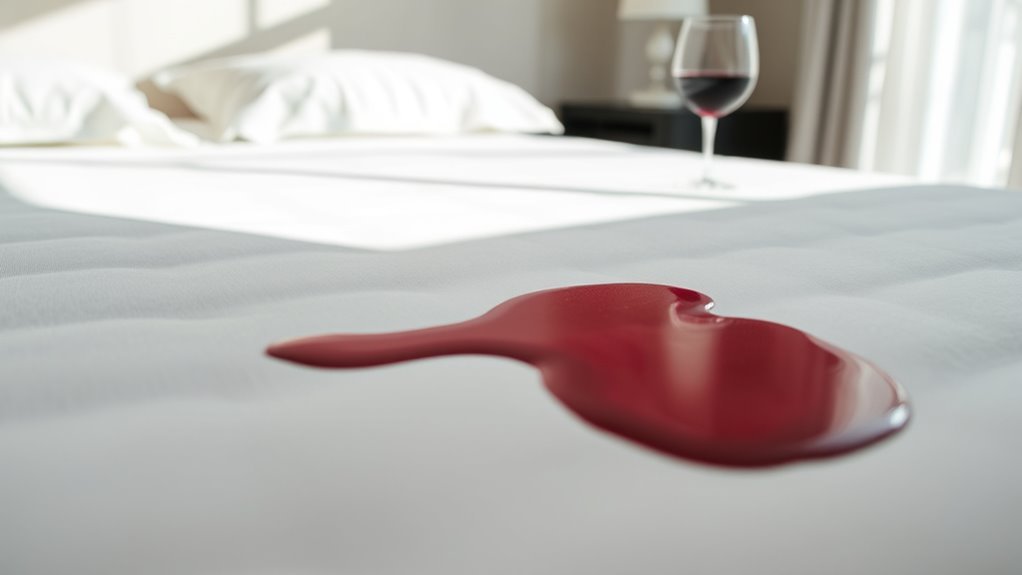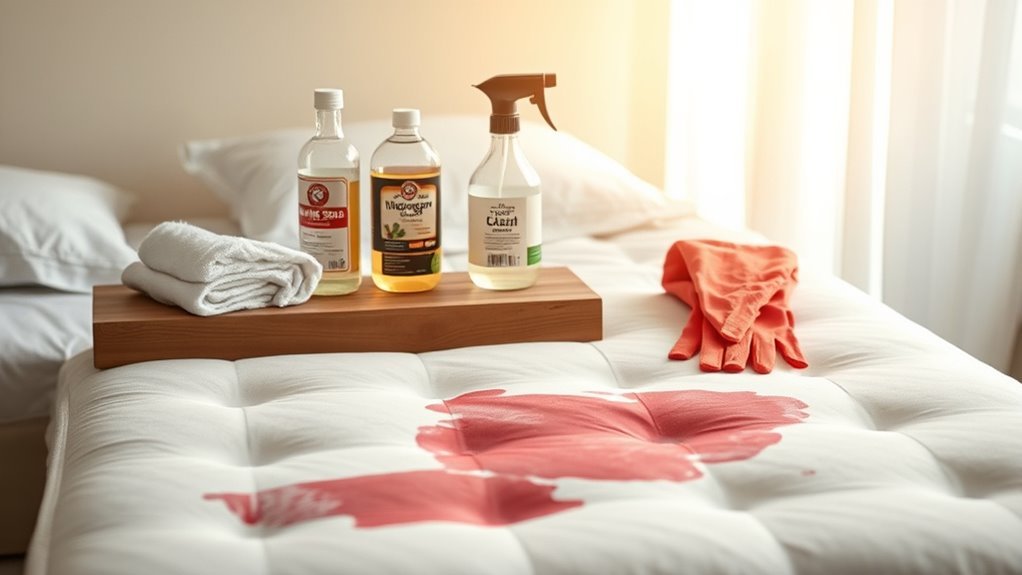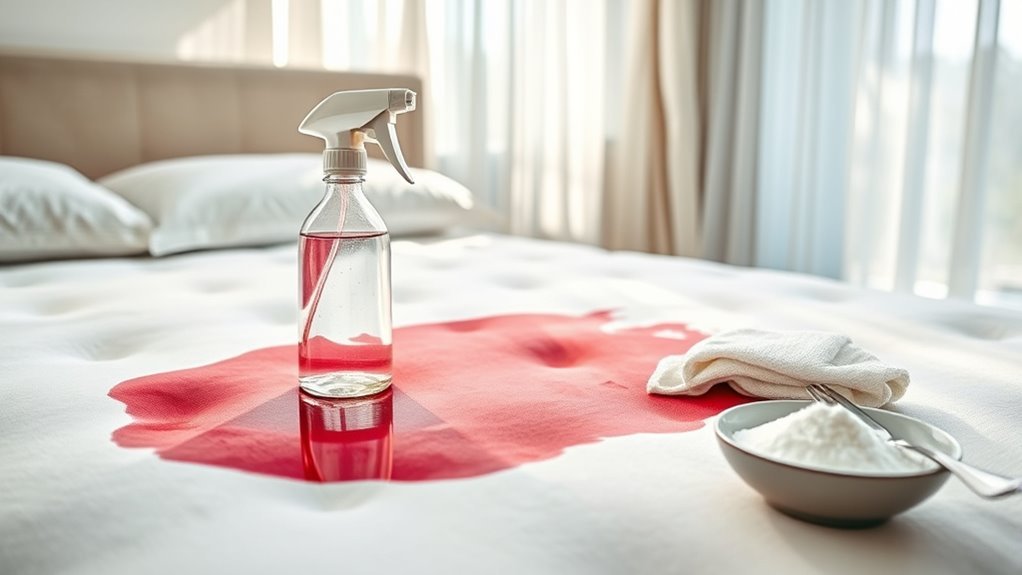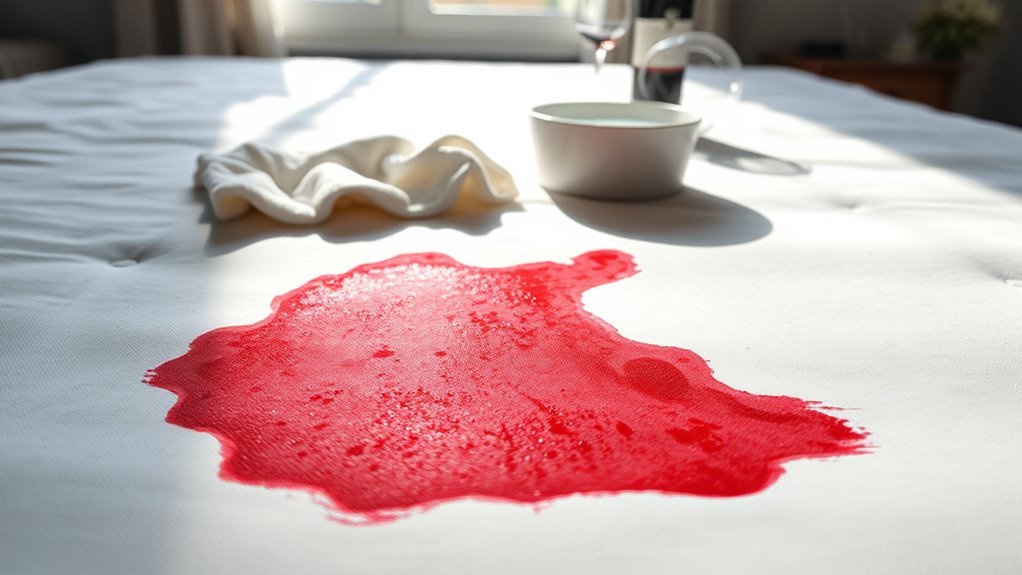To clean wine stains from your mattress, first, identify the stain and gather your supplies—gentle detergent, white vinegar, and baking soda work well. Blot the stain to absorb excess liquid, then prepare a cleaning solution. Apply it, blot again, and let the area air dry. For stubborn stains, try a baking soda paste or a vinegar solution. Remember, keeping your mattress protected can prevent future stains. There’s more to know about maintaining your mattress effectively.
Assessing the Damage: Identifying the Stain Type

How can you tell what kind of stain you’re dealing with on your mattress? Start by examining the stain characteristics. Different stains—like wine, blood, or sweat—have unique properties. For instance, wine stains often appear as dark, reddish spots, while blood stains may be brownish or rust-colored. Knowing the type of stain helps you choose the right cleaning methods.
Next, consider the texture and moisture level. Is it fresh and wet, or dried and crusty? Fresh stains require immediate attention, while older stains might need more intensive cleaning solutions. By identifying the stain type and its characteristics, you can effectively plan your cleaning strategy. This knowledge empowers you to tackle the issue and restore your mattress to a clean, comfortable state.
Gathering Your Cleaning Supplies

Before you start cleaning your mattress, you’ll need to gather the right supplies to guarantee an effective process. First, collect your cleaning products. You’ll want a gentle detergent or a specialized stain removal solution, white vinegar, and baking soda. These items are effective for tackling wine stains without damaging your mattress.
Next, grab a spray bottle for easy application and a clean cloth or sponge for blotting. A vacuum cleaner with an upholstery attachment can help remove debris from the mattress surface. If you have a soft brush, it can assist in loosening any stubborn stains. With these cleaning products in hand, you’ll be ready to tackle those wine stains and restore your mattress to its former glory.
Step-by-Step Cleaning Process

To effectively clean your mattress, follow this simple five-step process:
| Step | Action | Purpose |
|---|---|---|
| 1 | Blot the stain | Prevents spreading |
| 2 | Prepare a cleaning solution | Aids in stain removal |
| 3 | Apply the solution | Targets the stain directly |
| 4 | Blot again | Removes excess moisture |
| 5 | Air dry | Guarantees proper mattress maintenance |
Natural Remedies for Stubborn Stains
While stubborn stains can be a challenge, natural remedies offer effective solutions that are both safe and easy to use. Start with a baking soda paste by mixing it with water. Apply it directly to the stain, let it sit for 30 minutes, then vacuum it up. For tougher stains, try a vinegar solution—combine equal parts vinegar and water in a spray bottle, lightly mist the area, and blot with a clean cloth. You can also add a few drops of essential oils like lavender for a fresh scent. If stains persist, hydrogen peroxide can be used; just apply it carefully and test a small area first. These remedies can help restore your mattress without harsh chemicals.
Preventing Future Stains on Your Mattress
Keeping your mattress clean and stain-free requires proactive measures. Start by investing in a high-quality mattress protector; this is essential for effective stain prevention. Choose a waterproof, breathable cover that shields against spills, dust, and allergens.
Regularly wash your bedding and vacuum your mattress to eliminate dust mites and debris. If you enjoy a late-night snack or drink, be mindful and avoid eating or drinking on your mattress.
Creating a designated area for food and drinks helps maintain mattress protection. Additionally, consider spot-treating any spills immediately to prevent stains from setting in. With these simple habits, you can enjoy a clean, fresh mattress and extend its lifespan while maintaining your freedom to relax without worry.
Frequently Asked Questions
Can I Machine Wash a Mattress Cover With Wine Stains?
Yes, you can machine wash a mattress cover with wine stains, but it’s essential to check the care label first. For effective stain removal, pre-treat the stains with a gentle stain remover or a mixture of water and detergent before washing. Use cold water and a gentle cycle to avoid damage. After washing, make sure to thoroughly dry the cover to prevent mold. Keeping your mattress cover clean helps maintain a fresh sleeping environment.
How Often Should I Clean My Mattress?
You should clean your mattress every three to six months for ideal mattress maintenance. Regular cleaning helps eliminate dust mites, allergens, and bacteria, ensuring a healthier sleep environment. If you’ve got spills or stains, address those immediately to prevent permanent damage. Incorporate vacuuming and spot cleaning into your routine, and consider using a mattress protector for added protection. Keeping up with this cleaning frequency will extend your mattress’s lifespan and improve your sleep quality.
Will Wine Stains Damage My Mattress?
Wine stains can indeed damage your mattress if left untreated, like a stubborn shadow creeping into your peaceful sleep. If you act quickly with effective stain removal techniques, you can protect your mattress and maintain its integrity. Regular mattress care is essential; clean spills promptly and use protective covers to keep it in pristine condition. Remember, a little vigilance can safeguard your sanctuary from unwanted marks and guarantee restful nights ahead.
Can Professional Cleaning Help With Stubborn Wine Stains?
Yes, professional cleaning can definitely help with stubborn wine stains. They use effective stain removal techniques that you might not have access to at home. Trained professionals understand how to treat different fabrics and can often get results that DIY methods can’t match. If you’re feeling overwhelmed by the stain, it’s worth considering professional services to restore your mattress and give you peace of mind. Your mattress deserves the best care!
Are There Specific Mattress Types That Are Harder to Clean?
Yes, some mattress types are indeed harder to clean. Memory foam and latex mattresses tend to absorb liquids more deeply, making stains tougher to remove. Their dense materials can trap moisture and odors, so it’s crucial to act quickly. While you can use specific cleaning solutions, always check the manufacturer’s guidelines first. For the best results, consider using a mattress protector to prevent stains from setting in the first place.



